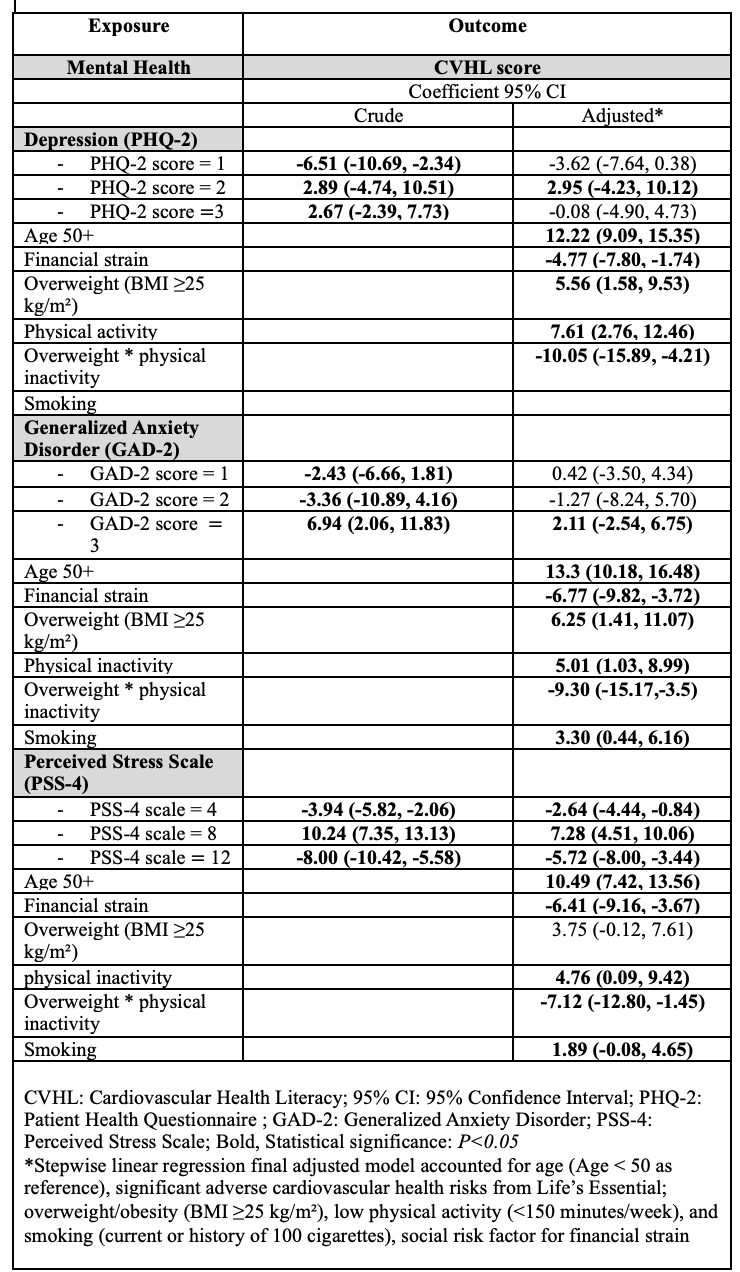Final ID: P1173
Opportunities for Intervention: Mental Health and Cardiovascular Health Literacy in Women – Insights from the Research Goes Red Initiative
Abstract Body: Introduction: Cardiovascular health literacy (CVHL) is vital for managing cardiovascular risk. However, poor mental health can be a barrier, and there's a gap in understanding how mental health impacts CVHL in women.
Hypothesis: We hypothesized that mental health has an association with cardiovascular health literacy. We further hypothesized that this would vary by younger age.
Methods: We conducted a cross-sectional study using data from the Research Goes Red registry and SAFE HEART study. Women aged ≥18 completed questionnaires on cardiovascular health literacy (CVHL) and mental health. CVHL was assessed using a validated tool, with scores ranging 0-100. It included knowledge of CVD risk factors, exercise, diet, and therapeutic interventions. Psychological health risk was measured using the Perceived Stress Scale (PSS-4; score 1-16), Generalized Anxiety Disorder scale (GAD-2; score 1-6), and Patient Health Questionnaire (PHQ-2; score 0-6) for assessing depression. Stepwise linear regression models evaluated associations between mental health and CVHL. Final adjusted models employed spline terms for PHQ-2 (scores 1, 2, 3), GAD-2 (scores 1, 2, 3), and PSS-4 (scores 4, 8, 12).
Results: A total of 677 women were included in the analysis. Mean age 40.07 (SD15.30), 29.08% Black, and 64.1% employed. Our analysis revealed complex associations between mental health measures and cardiovascular health literacy (CVHL). Perceived stress (PSS-4) showed a non-linear relationship with CVHL (β=-2.64, 7.28, -5.72 for scores 4, 8, ≥12 respectively; all p<0.05). Depression (PHQ-2) demonstrated a significant negative association at score 1 in the crude model (β=-6.51, 95% CI: -10.69, -2.34), which attenuated after adjustment. Anxiety (GAD-2) showed a significant positive association at scores ≥3 in the crude model (β=6.94, 95% CI: 2.06, 11.83), also attenuating after adjustment. Age ≥50 was consistently associated with higher CVHL scores across all models (β range: 10.49-13.3; all p<0.001). Physical activity <150 minutes/week showed a positive association (β=4.76, p<0.05), but interacted negatively with BMI ≥25 (β=-7.12, p<0.05). Financial strain was negatively associated with CVHL (β=-6.41, 95% CI: -9.16 to -3.67, p<0.001).
conclusion: Mental health and CVHL show complex relationships, older age consistently predicting higher CVHL. Financial strain negatively impacts CVHL, highlighting the need for targeted interventions addressing both psychological and socioeconomic factors.
Hypothesis: We hypothesized that mental health has an association with cardiovascular health literacy. We further hypothesized that this would vary by younger age.
Methods: We conducted a cross-sectional study using data from the Research Goes Red registry and SAFE HEART study. Women aged ≥18 completed questionnaires on cardiovascular health literacy (CVHL) and mental health. CVHL was assessed using a validated tool, with scores ranging 0-100. It included knowledge of CVD risk factors, exercise, diet, and therapeutic interventions. Psychological health risk was measured using the Perceived Stress Scale (PSS-4; score 1-16), Generalized Anxiety Disorder scale (GAD-2; score 1-6), and Patient Health Questionnaire (PHQ-2; score 0-6) for assessing depression. Stepwise linear regression models evaluated associations between mental health and CVHL. Final adjusted models employed spline terms for PHQ-2 (scores 1, 2, 3), GAD-2 (scores 1, 2, 3), and PSS-4 (scores 4, 8, 12).
Results: A total of 677 women were included in the analysis. Mean age 40.07 (SD15.30), 29.08% Black, and 64.1% employed. Our analysis revealed complex associations between mental health measures and cardiovascular health literacy (CVHL). Perceived stress (PSS-4) showed a non-linear relationship with CVHL (β=-2.64, 7.28, -5.72 for scores 4, 8, ≥12 respectively; all p<0.05). Depression (PHQ-2) demonstrated a significant negative association at score 1 in the crude model (β=-6.51, 95% CI: -10.69, -2.34), which attenuated after adjustment. Anxiety (GAD-2) showed a significant positive association at scores ≥3 in the crude model (β=6.94, 95% CI: 2.06, 11.83), also attenuating after adjustment. Age ≥50 was consistently associated with higher CVHL scores across all models (β range: 10.49-13.3; all p<0.001). Physical activity <150 minutes/week showed a positive association (β=4.76, p<0.05), but interacted negatively with BMI ≥25 (β=-7.12, p<0.05). Financial strain was negatively associated with CVHL (β=-6.41, 95% CI: -9.16 to -3.67, p<0.001).
conclusion: Mental health and CVHL show complex relationships, older age consistently predicting higher CVHL. Financial strain negatively impacts CVHL, highlighting the need for targeted interventions addressing both psychological and socioeconomic factors.
More abstracts on this topic:
Behavioral Components of Cardiovascular Health and Their Determinants Among Medical Students at the University of Danang, Vietnam
Giang Hoang Thi Nam, Tho Minh Hieu Le, Truong Thi Anh Nguyet, Nguyen Hung Nguyen, Vu Thanh-huyen
A Clinical Trial of Healthy Food Subsidies and Behavioral Interventions to Increase Fruit and Vegetable Purchasing in an Online StoreHua Sophia, Klaiman Tamar, Dixon Erica, Volpp Kevin, Putt Mary, Coratti Samantha, White Jenna, Hossain Mohammad, Posner Hannah, Wang Erkuan, Zhu Jingsan, John Aileen

